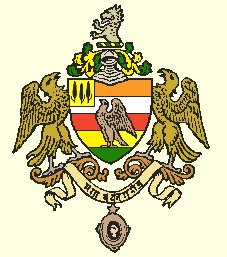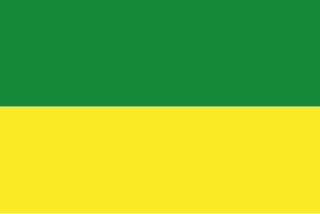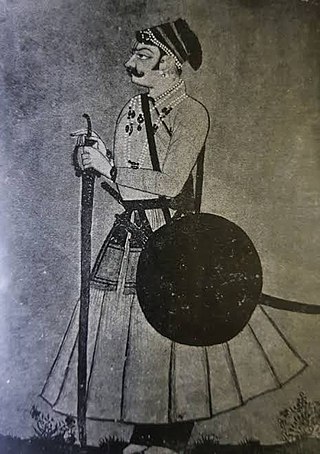
Ratlam is a city in the northwestern part of the Malwa region in Madhya Pradesh state of India. The city of Ratlam lies 480 metres (1,570 ft) above sea level. It is the administrative headquarters of Ratlam district, which was created in 1947 after the independence of India. It is located 294 kilometres west of the state capital Bhopal.

The Rathore dynasty or Rathor dynasty was an Indian dynasty belonging to the Rathore clan of Rajputs that has historically ruled over parts of Rajasthan, Gujarat and Madhya Pradesh. The Rathores trace their ancestry to the Rashtrakutas and later to the Gahadavalas of Kannauj, migrating to Rajasthan after the fall of Kannauj.

Sailana is a town in the Malwa region of the Indian state of Madhya Pradesh. Sailana is 25 km (16 mi) from Ratlam city and 50 km (31 mi) away from Banswara district of the neighboring state of Rajasthan.
Sailana was once the capital of the Sailana State before it merged into India. A fort belonging to the former royal family still stands tall in Sailana. The Kedareshwar temple, situated 4 km (2.5 mi) from Sailana is a notable shrine.
Malwa Agency was an administrative section of British India's Central India Agency. The headquarters of the political agent was at Neemuch (Nimach). The other chief towns of the region were : Ratlam and Jaora.

Raja Jaswant Singh I was the Rathore ruler of the Kingdom of Marwar in the western part of Rajputana modern day Rajasthan. He was a distinguished man of letters and author of noted literary works like Siddhant-Bodh, Anand Vilas and Bhasha-Bhushan.

The Kingdom of Amber, later the Kingdom of Jaipur or the Jaipur State, was located in the north-eastern historic Dhundhar region of Rajputana and was ruled by the Kachwaha Rajput clan. It was established by Dulha Rai, possibly the last ruler of the Kachchhapaghata dynasty of Gwalior who migrated to Dausa and started his kingdom there with the support of Chahamanas of Shakambhari with coalition of Gaur dynasty of sheopur in the 12th century. Mostly through 12th to 15th century, the kingdom faced stagnation, sources were scarce. Under its ruler, Raja Chandrasen of Amber became a Sisodia vassal and fought in the Battle of Khanwa under Raja Prithviraj Kachhwaha.

Idar State, also known as Edar, was a princely state located in present-day Gujarat state of India. During the British era, it was a part of the Mahi Kantha Agency, within the Gujarat Division of Bombay Presidency.

The Kingdom of Mewar was an independent Hindu kingdom that existed in the Rajputana region of the Indian subcontinent and later became a dominant state in medieval India. The kingdom was initially founded and ruled by the Guhila dynasty followed by the Sisodiya Dynasty. The kingdom came to be known as the Udaipur State after it became a princely state under British suzerainty in the nineteenth century.

Kingdom of Marwar, also known as Jodhpur State during the modern era, was a kingdom in the Marwar region from 1243 to 1818 and a princely state under British rule from 1818 to 1947. It was established in Pali by Rao Siha, possibly a migrant Gahadavala noble, in 1243. His successors continued to struggle against regional powers for domination and 9 out of 15 rulers till 1438 died in combat. In 1395, its capital was changed to Mandore by Rao Chunda of Mandore and to Jodhpur in 1459 by Rao Jodha.
Raoti or Rawati is a town and tehsil of Ratlam district in the Indian state of Madhya Pradesh. It was once a part of the Sailana State It falls in the Malwa region of Madhya Pradesh.

Maharao Chatra Sal or Shatru Sal (1632–1658) was one of the most prominent and illustrious ruler of Hada-Chauhan dynasty of the Kingdom of Bundi. He built the temple of Keshavrao at Kishorai-Patan and Chatra Mahal in the upper storey of Taragarh Fort,Bundi.

Ratlam State was a 13 gun salute princely state in India, part of the Malwa Agency of Central India during the British Raj.

Bundi State, founded by Hada Rao Devda, was a princely state in India. The former state was located in modern-day Rajasthan. It was ruled by Hada Chauhan Rajputs.

Sailana State was an 11 gun salute princely state in India, part of the Malwa Agency of Central India during the British Raj. The state enjoyed an estimated revenue of Rs.5,00,000.
Ahirwada was a historic region located between the Parvati and Betwa rivers in Central India or modern Madhya Pradesh. It was between the cities Bhilsa and Jhansi. Historically Ahirwada was ruled by members of the Ahir community.

Bikaner State was the Princely State in the north-western most part of the Rajputana province of imperial British India from 1465 to 1947. The founder of the state Rao Bika was a younger son of Rao Jodha ruler of and founder of the city of Jodhpur in Marwar. Rao Bika chose to establish his own kingdom instead of inheriting his father's. Bika defeated the Jat clans of Jangladesh which today refers to the north and north-western Rajasthan along with his uncle Rao Kandhal and his adviser Vikramji Rajpurohit and founded his own kingdom. Its capital was the city of Bikaner.
Events in the year 1707 in India.

Bala is a village and a Gram Panchayat in the Ahore Tehsil of Jalore district of Rajasthan in northwest India.

Raja Ratan Singh was the founder of the city of Ratlam and its eponymous Ratlam State, governor of 16 parganas in northern Malwa and a renowned warrior of his time. He gained fame under the patronage of the Mughal emperor Shah Jahan.

















